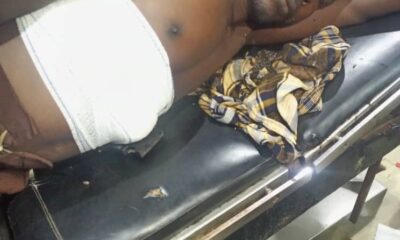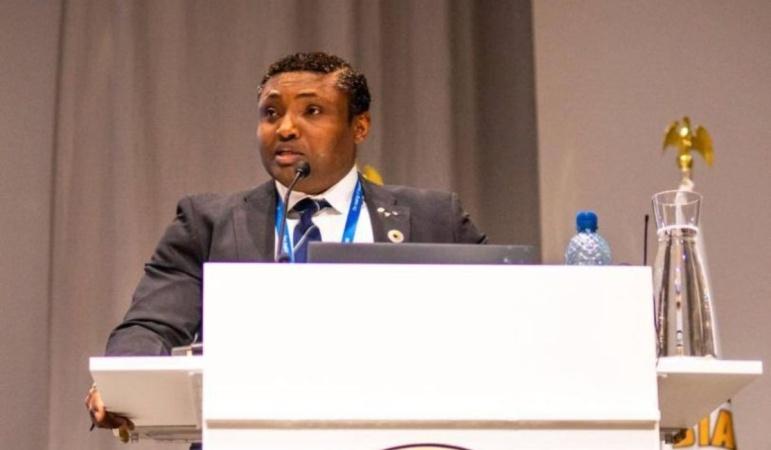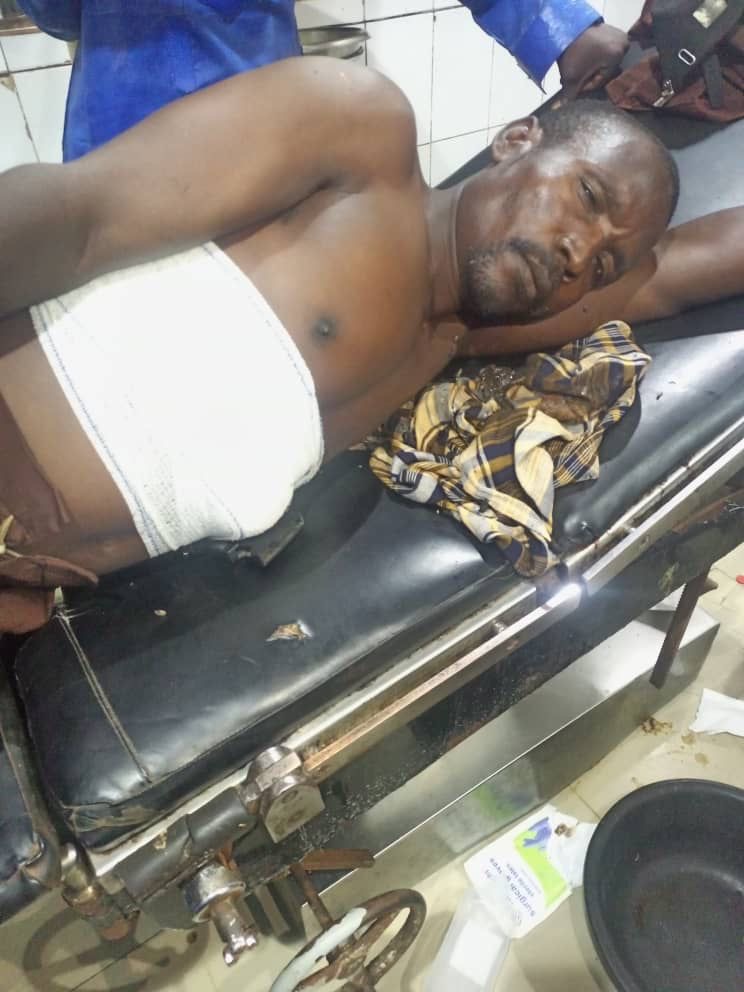- Followers declare United States of Biafra in Finland
Pro-Biafran agitator Simon Ekpa, who was arrested in Finland for alleged terrorism-related activities, will spend Christmas in detention, as Finland’s legal system does not allow for bail.
Mikko Laaksonen, a Senior Detective Superintendent at Finland’s National Bureau of Investigation, confirmed this (to Saturday Punch) in an email.
The news comes as Ekpa’s supporters declared the establishment of the United States of Biafra during a conference held in Finland on Friday.
Last week, the Finnish government announced the arrest of Ekpa and four others on suspicion of terror-related offenses, including incitement to violence and terrorism financing.
Finnish police have confirmed that Ekpa, who calls himself the Prime Minister of the Biafra Republic Government-in-Exile, allegedly used social media to incite violence in the South-East region, targeting both civilians and authorities.
According to local publication Yle, Ekpa was remanded in custody by the Päijät-Häme District Court on charges of public incitement to commit a crime with terrorist intent.
The publication reported that the Finnish Central Criminal Police confirmed the arrest in a statement last Thursday, noting that other suspects were apprehended for allegedly financing terrorist activities.
Also, Ekpa is scheduled to face charges in May 2025, according to Finnish authorities.
When asked if Ekpa’s charges were bailable or if the prosecution was disposed to releasing him on bail, Laaksonen said, “Finnish criminal procedure/coercive measures do not recognise bail procedure.
“Our procedure is based on, depending on the case, remand or travel ban as coercive measures for limiting freedom of movement for persons suspected of offences to which such measures are applicable.”
- Supporters Declare Biafra
In Finland, Ekpa’s supporters converged on Lahti in Finland on Friday to declare the United States of Biafra.
A few days before the conference, videos circulated on social media showing a significant influx of Nigerians into Finland for the event tagged, ‘Biafra Mass Exodus 2024’.
An X user, @DOlewunne, tweeted, “Huge in Finland Under His Excellency the Prime Minister of Biafra Simon Ekpa (sic). The re-declaration of the Independent State of Biafra/United States of Biafra is in full swing. This historic independent moment is championed by the People of Biafra. We are a Nation! (sic).”
The convener of the convention, who introduced herself as the Chief of Staff of the United States of Biafra and the organiser of the Biafra Declaration of the Restoration of the United States of Biafra Convention 2024 in Finland, is Dr Ngozi Orabueze.
According to several online sources, Orabueze is a family nurse practitioner in Atlanta, Georgia, with expertise in treating diabetes, bipolar disorder, and depression, among other conditions.
She was first appointed by Ekpa in March 2023 as Minister of Health, Oil and Gas, Biafra Republic Government in Exile.
Orabueze, who has over 17,500 followers on X and more than 12,000 on Facebook, wrote on November 27 that the convention was to take place in Lahti, noting that it would kick off with a live X Space event.
On 28 November, she wrote, “Biafrans are trooping into Finland in droves ahead of the re-declaration of the independent state of Biafra,” attaching a video of a large Igbo-speaking crowd awaiting clearance at the Finnish airport.
On Friday afternoon, Orabueze posted on her verified X handle, @ngoziora, that Biafrans had declared an independent state and would now use their own currency (Biafra coins) and time (Biafra time), notifying the Nigerian government and the international community.
The declaration of Biafra’s independence, initially slated by Ekpa for December 2, faced some setbacks following Ekpa’s arrest and prosecution by the Finnish government.
Orabueze wrote, “Breaking: It is done. Biafrans in Finland for the declaration of the independent United States of Biafra. Power belongs to the people.” She later added, “Biafra has been re-declared today, 29th of November 2024, by Ngozi Orabueze, the Chief of Staff, United States of Biafra. Congratulations to all Biafrans all over the world.”
Before the declaration, a video of Ekpa addressing the audience was played online.
Ekpa stated, “We were free before Lord Lugard came. If you want the oil, take it and leave us alone. We are tired of living as baboons and monkeys. We want to be given the opportunity to practise what we have studied.”
As the video ended, the audience began to chant, “USB, USB, USB,” meaning the United States of Biafra.
Afterwards, Orabueze, taking the oath of office, listed the states within the newly re-declared United States of Biafra.
These included Anambra State, Okigwe State, Nnewi State, Ogoni State, Opobo State, Ikwerre State, Etche State, Okrika State, Ngwa State, Orlu State, among others. The crowd cheered her on in both Igbo and English.
After the declaration, the crowd sang an Igbo song, “Biafra aga’m arapu gi,” translating to “Biafra, I will never let you go.”
Earlier in videos and photos shared on X, several members of the group claimed they were just landing at the Finnish airport in Helsinki.
A woman, @Charedims, who took a video while on a flight, said, “Biafrans all over the world from different continents everywhere are converging on Lahti for the convention.
“On December 2, when all votes are counted and collated, a mandate will be given to our prime minister, Simon Ekpa Njoku, who is currently answering some questions with the Finnish authorities; when the votes are counted, he will then declare the restore of the independent state of Biafra, which means he has the legal rights to get us Biafra. That is why you are seeing everybody jumping up and down.”
- IPOB Disowns Group, MASSOB Denies Claim
Reacting to the development, IPOB’s spokesperson, Emma Powerful, rejected the notion that the group was behind the event.
He stated, “IPOB has no involvement in any conference. Those people (Ekpa’s faction) are criminals supporting illegal activities to destroy our land. There is no such thing as a declaration of Biafra from our side.
“Any claim that IPOB is hosting a conference is false. When IPOB decides to make such an important announcement, the whole world will know. Those making such statements are fake.”
The spokesperson for the Movement for Actualization of the Sovereign State of Biafra, Sunday Edeson, stated that if IPOB succeeded in the realisation of Biafra through its declaration, MASSOB would accept and rejoice with them.
He added that the British government would never support the freedom of Biafra.
“Everyone has the right to declare. They declared their freedom in Finland, but we know that we’re still under Nigerian leadership. We support them.
“Declaring independence in Finland doesn’t mean we’re free from the Nigerian government. We still use Nigerian currency, and security agencies are still from Nigeria. So, we’re still under Nigeria’s control,” Edeson said.
Meanwhile, a spokesperson for the Ministry of Foreign Affairs, Kimiebi Ebienfa, told Saturday PUNCH that Nigeria did not have an extradition agreement with Finland.
Also, Finland through the Finnish Embassy in Nigeria said it could not comment on the matter.
The Director of Defence Information, Brig Gen Tukur Gusau, had said Ekpa, a self-proclaimed disciple of IPOB leader, Nnamdi Kanu, should be extradited to Nigeria to face criminal charges.
Many Nigerians online also demanded his repatriation to Nigeria to face terrorism charges.
In response to the call for Ekpa’s extradition, a lawyer during ‘The Morning Show’ on AriseTV, Chukwuma Ezeala, said that Finnish-based Nigerian was charged with terrorism and countries involved must cooperate.
He stated that he could be tried in Nigeria or Finland.
“On the issue of extradition, for him to be extradited, there must be a bilateral agreement. From all indications, Nigeria doesn’t have a bilateral agreement with Finland.
“However, since it’s an international crime, he can still be extradited to Nigeria based on international conventions.
“The question will now be, can Nigeria satisfy conditions or requirements of extraditing a person to Nigeria without a bilateral relationship,” Ezeala queried.
Credit: The Punch

 BIG STORY13 hours ago
BIG STORY13 hours ago
 BIG STORY5 days ago
BIG STORY5 days ago
 BIG STORY3 days ago
BIG STORY3 days ago
 BIG STORY4 days ago
BIG STORY4 days ago
 BIG STORY5 days ago
BIG STORY5 days ago
 BIG STORY4 days ago
BIG STORY4 days ago
 BIG STORY5 days ago
BIG STORY5 days ago
 BIG STORY1 day ago
BIG STORY1 day ago





















